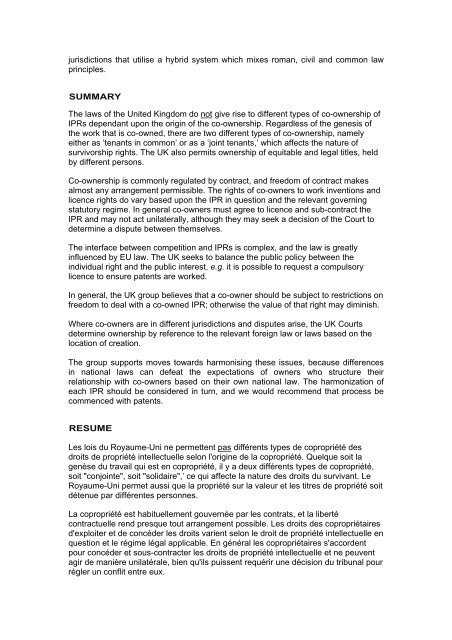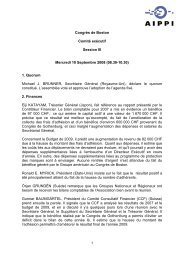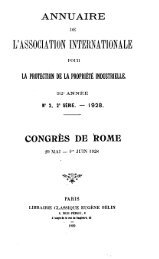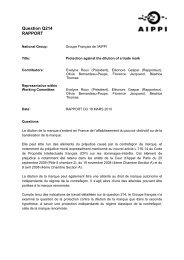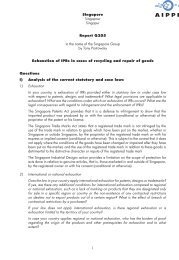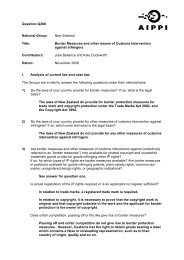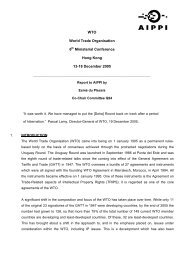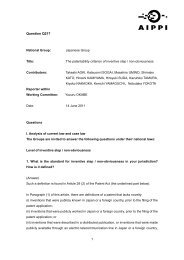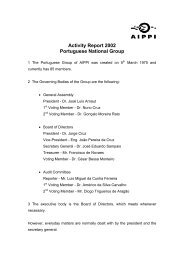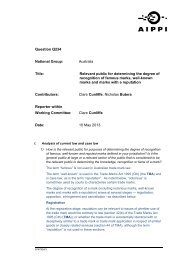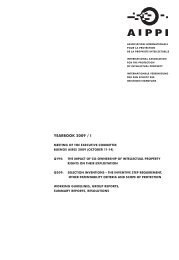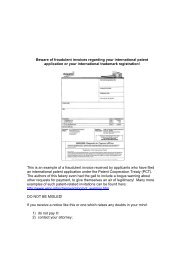Question Q194 National Group: United Kingdom Title: The ... - AIPPI
Question Q194 National Group: United Kingdom Title: The ... - AIPPI
Question Q194 National Group: United Kingdom Title: The ... - AIPPI
Create successful ePaper yourself
Turn your PDF publications into a flip-book with our unique Google optimized e-Paper software.
jurisdictions that utilise a hybrid system which mixes roman, civil and common law<br />
principles.<br />
SUMMARY<br />
<strong>The</strong> laws of the <strong>United</strong> <strong>Kingdom</strong> do not give rise to different types of co-ownership of<br />
IPRs dependant upon the origin of the co-ownership. Regardless of the genesis of<br />
the work that is co-owned, there are two different types of co-ownership, namely<br />
either as ‘tenants in common’ or as a ‘joint tenants,’ which affects the nature of<br />
survivorship rights. <strong>The</strong> UK also permits ownership of equitable and legal titles, held<br />
by different persons.<br />
Co-ownership is commonly regulated by contract, and freedom of contract makes<br />
almost any arrangement permissible. <strong>The</strong> rights of co-owners to work inventions and<br />
licence rights do vary based upon the IPR in question and the relevant governing<br />
statutory regime. In general co-owners must agree to licence and sub-contract the<br />
IPR and may not act unilaterally, although they may seek a decision of the Court to<br />
determine a dispute between themselves.<br />
<strong>The</strong> interface between competition and IPRs is complex, and the law is greatly<br />
influenced by EU law. <strong>The</strong> UK seeks to balance the public policy between the<br />
individual right and the public interest, e.g. it is possible to request a compulsory<br />
licence to ensure patents are worked.<br />
In general, the UK group believes that a co-owner should be subject to restrictions on<br />
freedom to deal with a co-owned IPR; otherwise the value of that right may diminish.<br />
Where co-owners are in different jurisdictions and disputes arise, the UK Courts<br />
determine ownership by reference to the relevant foreign law or laws based on the<br />
location of creation.<br />
<strong>The</strong> group supports moves towards harmonising these issues, because differences<br />
in national laws can defeat the expectations of owners who structure their<br />
relationship with co-owners based on their own national law. <strong>The</strong> harmonization of<br />
each IPR should be considered in turn, and we would recommend that process be<br />
commenced with patents.<br />
RESUME<br />
Les lois du Royaume-Uni ne permettent pas différents types de copropriété des<br />
droits de propriété intellectuelle selon l'origine de la copropriété. Quelque soit la<br />
genèse du travail qui est en copropriété, il y a deux différents types de copropriété,<br />
soit "conjointe", soit "solidaire",’ ce qui affecte la nature des droits du survivant. Le<br />
Royaume-Uni permet aussi que la propriété sur la valeur et les titres de propriété soit<br />
détenue par différentes personnes.<br />
La copropriété est habituellement gouvernée par les contrats, et la liberté<br />
contractuelle rend presque tout arrangement possible. Les droits des copropriétaires<br />
d'exploiter et de concéder les droits varient selon le droit de propriété intellectuelle en<br />
question et le régime légal applicable. En général les copropriétaires s'accordent<br />
pour concéder et sous-contracter les droits de propriété intellectuelle et ne peuvent<br />
agir de manière unilatérale, bien qu'ils puissent requérir une décision du tribunal pour<br />
régler un conflit entre eux.


